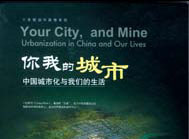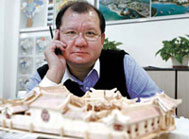Turning waste paper into valuable products
Chen works about eight hours a day. He ends his day at the scrap center, where he sells his collection before returning to his suburb home in Changping district of Beijing.
"This is my life since I came to Beijing eight years ago," says the 32-year-old native of Hebei province, as he sorts out the paper from his vehicle.
He collects a daily average of 400 kilograms of waste paper, consisting mostly of newspapers.
Related: When paper saves the earth
Recyclers like Chen are the backbone of waste paper recycling in China.
Some recyclers collect trash from the streets or go from door to door; while others run recycle stations or collection points.
Most of the recyclers are rural residents who have migrated to cities and towns. According to a report by the Beijing Resource Recycling Association, about 98 percent of the capital's 120,000 registered recyclers come from provinces including Henan, Anhui and Hebei.
 |
But the actual figure could be about 200,000 as some recyclers have not registered themselves, says Beijing University of Technology researcher Cheng Huiqiang, who specializes in the economics of recycling.
Unlike many recyclers who collect randomly, Chen usually picks up old newspapers from regular customers, including from big organizations.
His rate for old newspapers is 1.20 yuan (20 cents) per kilogram, and he sells them to scrap centers at about 1.40 yuan. Waste books are collected for 0.80 yuan per kilogram and sold at about 1 yuan.
"Prices for everything are going up, except waste like paper," he jokes.
When he first got involved in waste paper recycling, Chen earn 0.40 yuan per kilogram of collected paper - an attractive remuneration compared to farming.
"But the profit margin is narrower nowadays," Chen says, adding that business has become tougher because of the hike in costs, such as for gas.
Without his own storage space, Chen must sell his collection to scrap centers at Dongxiaokou town in suburban Beijing every day.
Dongxiaokou is the capital's largest waste trading center, attracting scores of collectors dealing with waste paper, scrap metal, plastic and foam.
Waste is sorted and processed in the town. Some waste paper dealers visit the center to buy old books to sell to flea markets. Old newspapers are sorted and transported to paper mills, while boxes end up in packaging stations.
On a good day, recycling centers at Dongxiaokou such as Liu Li's, receives about five tons of waste paper from recyclers.
 |
Liu, 42, who hails from Henan province, runs the recycling center with her husband. Hills of paper, packed or unpacked, fill her courtyard. Throughout the day, her workers are seen packing and loading packed paper onto trucks.
According to Liu, there are about 40 similar scale paper recyclers in Dongxiaokou. Some recyclers, like Chen Xiaozhuo, sort out their goods before selling them to Liu.
Sorting is a critical step for paper recycling. Different sorts of recycled papers need to be handled differently in their regeneration process.
Depending on the recycled paper's fiber lengths, different kinds of paper machines and treatment procedures are involved to produce different finished products.
"Most people do not consciously sort waste papers when they throw them away," Chen says. "Some are dirty and dusty. Who will bother wasting their time to sort this garbage carefully?
"But for us, it's part of our work. Coated paper, magazines and old books must be separated from the newspapers," Chen explains.
Earning less than 40,000 yuan a year, he lives alone in a one-room flat in the suburb at 200 yuan per month.
"I've been collecting waste paper for years and don't know anything else," he says. "I live thriftily when business is poor. I may consider quitting if the situation turns bad."
















